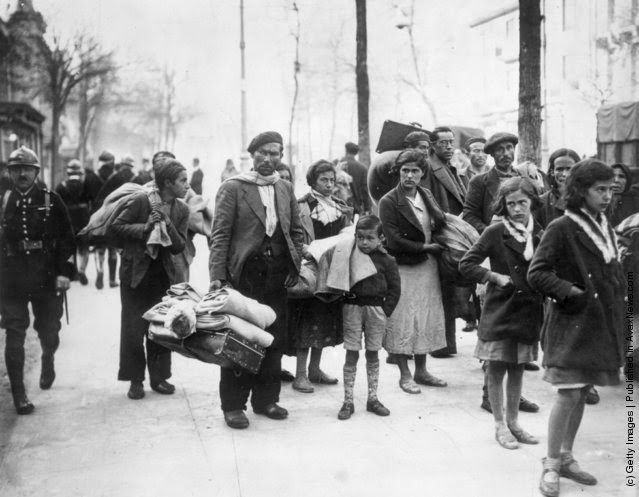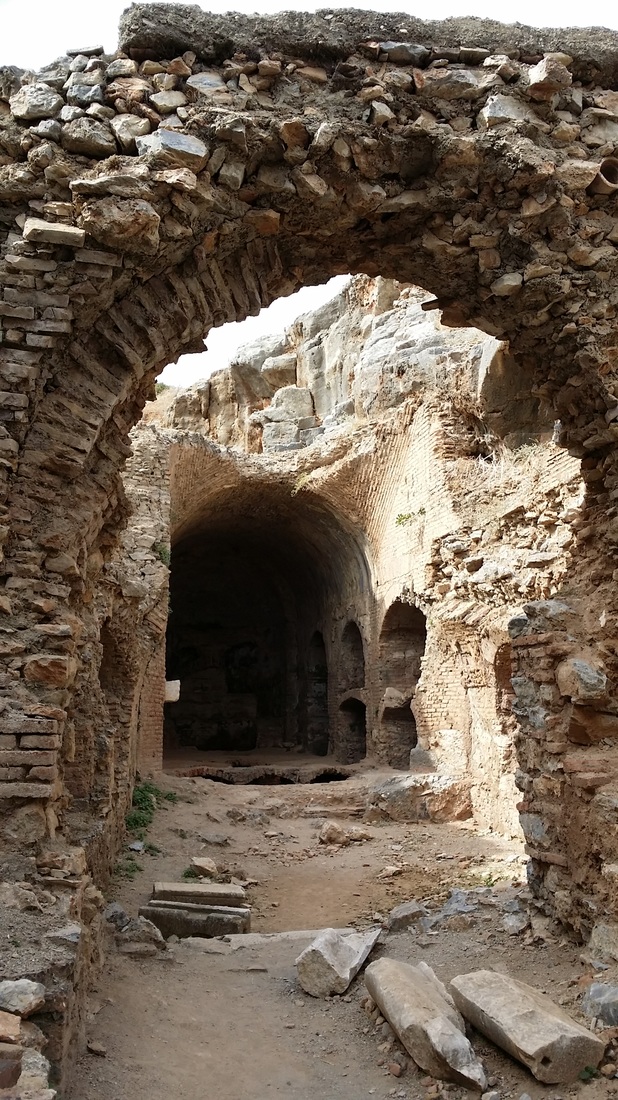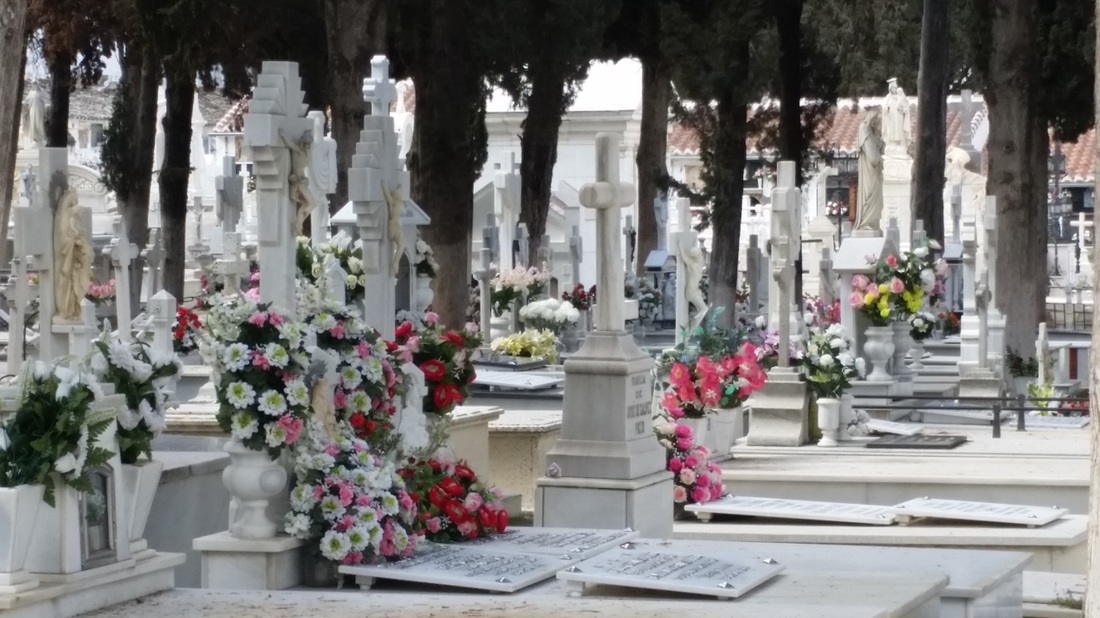|
“For a while" is a phrase whose length can't be measured. At least by the person who's waiting.
― Haruki Murakami Our involvement with refugees is at a standstill right now, sadly. It is painful to be in a state of waiting. In October, we were asked by the local government - via the NGO we work with - to be on-call to work with 200 refugee families who would be resettled in our town of Antequera, Spain. In Spain, no one has access to refugees except through invitation of officials and that only occurs via an officially recognized NGO. We are fortunate that Billy sits on the board of a local NGO and, therefore, was able to be poised to help. They would be a handful of the 15,000+ who were to be resettled in Spain by the end of December. As of today, that still has not occurred. New vetting procedures were implemented which all but halted the resettlement process. The backlog of refugees and asylum seekers vying for resettlement in Europe astounding, and Spain has only agreed to take a few. In January, we were told to continue to stand on-call and we would be notified when resettlement occurred. Still... nothing today and we are well into March. “Waiting on God requires the willingness to bear uncertainty, to carry within oneself the unanswered question, lifting the heart to God about it whenever it intrudes upon one's thoughts.” ― Elisabeth Elliot The sad truth of the matter is that Spain was extremely hesitant to take refugees in the first place. The government all but refused. However, that was a very unpopular stance with the public and petitions and public uprising caused the government to change their decision and agree to accept 15,000 refugees. That being said, Amnesty International just put Spain on their list of worst countries for human rights infractions... partially because of the government's poor treatment of immigrants and refugees over the past year. Spain has seen their share of immigrants and refugees, for sure. But these do not come to us via legal channels. Not unlike our home state of Texas, Spain is the southern-most border of European nations. We are a country of first entry. Most immigrants and refugees cross the Mediterranean from Morocco, coming up to us from West African nations, or crossing to us from Syria and Middle Eastern countries by crossing North Africa and coming up across the tiny 8 mile stretch of sea at The Strait of Gibraltar. The Spanish population as a whole is very considerate of and compassionate toward the current plight of refugees. They remember that they, too, were once refugees fleeing a horrible civil war and a terrible dictator in the 1930s and 40s... a cruel dictatorship that lasted until 1978. The refugee cause is not far removed from the Spanish population. I have seen family photos of local families as they were fleeing Spain and heading for France and Morocco. We recently met a woman who was a baby when her family fled to Morocco, chased by the dictator's army. Her father had a price on his head. He was one of the original writers of the Spanish constitution in the early 1930s and this made him a dangerous political figure. They fled to Morocco, then crossed the Atlantic by ship to Mexico, where she lived most of her life. So, she has lived her entire life as a refugee from Spain. The refugee situation is close to the hearts of Spanish population, to say the least. I have talked with many who say, “We were cared for. We were taken in. We must return this kindness to humanity.” However, current Spanish government has had their own ideas. “One of the greatest strains in life is the strain of waiting for God.” ― Oswald Chambers We are sad that the current situation is that we are still in a holding pattern. There are currently talks between EU countries may change some things, but we fear not for the better. It now appears that instead of resettling refugees in Spain and other EU countries, those countries have decided to attempt to pay other countries to take their share of refugees off their hands. Sadly, the ‘least of these’ have become bargaining chips. It appears that these precious lives are worth about 3 billion Euros... that is what they want to pay Turkey in order for them to not allow refugees out of Turkey and into other EU countries. This makes me so sad. People are trying to be creative and figure out ways around the situation. Just this week, NGOs and private entities have made inroads in what appears to be a way to skip the government backlog and contract to bring numbers of refugees directly in to municipalities in Spain that wish to take refugees now and are prepared with infrastructure and resources. Tired of red tape, they are taking the situation in to their own hands. I wish I could write about how we are currently ministering to refugees in Antequera. Instead, we continue wait. We are ready to help. We pray for solutions. I'm sure that God's heart is sad, too. Scripture has so much to say about this situation. It is difficult to know that people – children of God – people whom God loves and adores - are standing at the door knocking and we cannot open the door. People are in need, people are ready to help, yet our hands are tied with red tape. Patience is power. Patience is not an absence of action; rather it is "timing" it waits on the right time to act, for the right principles and in the right way. ― Fulton J. Sheen ** Please note that this situation changes daily. Two days ago, the situation with the Spanish parliment and their vote in the EU discussions was completely 180 degree difference from what is is today in the latest news. By the time you read this, it could be different still. Antonio* was the first friend we had when we moved to Antequera. We had met a couple of other people in those first few days, but Antonio was the guy who just enveloped us in happiness and hugs. He embraced us, quite literally with his giant bear hugs, and with his easy and quick friendship. We had been told, “Spaniards are a tough lot. You’ll never get close to them. You might become friendly acquaintances, but never true friends.” But we were having a tough time believing that with Antonio in our lives.
Antonio is this big teddy bear of a guy, a walking talking Santa Claus-type. Always smiling and joking around. Best friend to the world. Billy quickly fell right in with Antonio. They met several times a week for coffee or to do things in town. Antonio invited Billy in to his home (another thing we were told would never occur in Spain) to share stories and to help each other with language. Antonio became Billy’s language helper for Spanish, and Billy helped Antonio learn some English. Antonio has been a huge help to us in cultural matters – he is a trusted friend who will always tell us the truth, always tell us when we might be stepping in too deep, or alert us to cultural landmines that we could never have known without guidance. He introduces us to people, he invites us to picnics and cookouts, and he helps us get connected to opportunities to serve in our town. In our disciple group, Antonio is very attentive to the stories about Jesus’ treatment of the marginalized. He is highly participatory in our story discussions when it comes to lepers and the unclean and the unjust treatment of others. I have always been touched by his keen sense of understanding and compassion, and I have loved him for his tender heart during these studies. One week, as we studied another story about the unclean, specifically as it pertained to death, Antonio reminded the group of the modern day treatment in Spain of undertakers. Because our class is almost exclusively native Spaniards, this story was commonplace for them. They all knowingly shook their heads like it was just another story. But for me, it was new knowledge that rocked my world. Undertakers or morticians are considered unclean, still in this day and age. Those who deal with death are marginalized. When the undertaker goes in to a restaurant or café, there is a specific place for him to sit. He has a special set of dishes that are set aside for only his use. Because this is a small town, everyone knows the undertaker. When he arrives, he knows where to sit and the staff know to go and get the dishes that are reserved for only him. Even his glass and his silverware is set apart from the general public. This is 2016! This is a European nation, a ‘first world’ country! This was a huge shock to me. I kept my ‘learner face’ on and stayed in my cultural anthropological stance, but I was just dying inside. How could this be true today, in 2016? This is the kind of treatment that I know happens in developing nations and ‘3rd world countries’… but this is SPAIN! I worried on this story for a few weeks. I just couldn’t get over it. And my heart broke for Antonio… you see, my friend Antonio is an undertaker. For years, he has been the one who arrives at the hospital or at private homes to pick up the deceased and care for the body. He has been the one who has compassion in the darkest moments. He has been the one who goes to the funeral home, who does all that needs to be done in those hours between death and burial, and who sees to the final moments before loved ones say their last goodbyes. It is a tough job on even the best of days. Sadly, Antonio has been out of work since just before we moved here - a downsizing of funeral home staff in the middle of a major economic crisis put Antonio on the unemployment rolls, where he has been for 3 years now. It seems that it’s also difficult for a former undertaker to find a new job. Antonio never talks about that. He just continues to look for work. This past week, I asked Antonio if he would revisit that story with me – the story about the dishes and the marginalization of undertakers. Although he had not told the story in first person, I wondered. I asked him if that had applied to him, if he had lived that reality. “Yes. Yes, that story is my story,” he said. “That is the reality for undertakers.” A new wave of pain and compassion came over me. This is my friend, we are talking about. This is a part of his story that had never dawned on me. I could never have known to ask about it because it is so far from my culture and understanding that I would never have thought of it. I pushed on, “Antonio, what does that do to your heart?” A deep breath, then he softened and his body changed. He smiled a little, the smile of realizing that someone just saw through to your soul. He answered, “You have to make your heart hard. Hard so it won’t hurt.” His eyes brimmed with tears. “Obviously, it hurts, Antonio. Your heart is not hard.” “Yes, sometimes it hurts. People make jokes about me, off-handed things that are funny to them. Even friends tell jokes about me. I laugh and try to let it roll off. I try. But my wife – it is terrible for her. It hurts her deeply. She has never recovered from hearing people’s jokes and how people treat me.” Antonio’s wife has suffered years of debilitating clinical depression. Many days, she cannot leave the house. Antonio, too, suffers from depression and several related health issues. I’m seeing a much bigger picture of my friend and his heart. He goes on to tell me about other indignities of being the undertaker. Gas station attendants refused to wait on him or pump the gas at the full service pumps. They wouldn’t go near the hearse. The public shunned him and turned away when he was with the car. Even the dead merit more dignity than the living, breathing man who attends to them. My heart is so heavy for my friend. Jovial, peaceful, compassionate Antonio. To know the pain that he has felt, that he still feels. To now understand, to be able to see the mask that he wears with the world. To know that this precious man has been marginalized. Now I know why he is passionate about the Jesus who reached out to the unclean, the Jesus who touched lepers and had compassion for those who were shunned and cast out. Antonio is intimately and passionately in love with the Jesus who entered in to death, who had compassion for Lazarus, who touched the dead, who Himself was dead and experienced the tomb… and is now Alive. I’m honored to call the undertaker my friend. *Antonio’s name has been changed. |
Laurie DrumIn my USA life, I was a teacher in Texas for 15 years. I was also a professional photographer, a soccer mom, a horsewoman, and the neighborhood hospitality queen. I did "Joanna Gaines farmhouse style" before Chip and JoJo were even a thing - we restored an 1884 Victorian farmhouse in small town Texas and did shiplap walls until I thought I'd go crazy. I taught at NASA, scuba dived with astronauts in training, and studied animals at Sea World for educational purposes. I've tried just about everything, because I have an insatiable need to know if I can do it! Never underestimate a Texas girl in cowboy boots! In 2006, my husband Billy and I became cross-cultural workers (CCWs) with TMS Global. For five years, we served in three rural Quechua Wanca villages in the Andes of Peru. And when I say rural, I mean RURAL - like no potty! I spent my days in Peru learning to live a Quechua lifestyle in a rustic adobe house - cooking Peruvian foods, sewing with Quechua women, raising my chickens and goats and pigs, and planting my gardens. Now I live my life in small town Spain, serving other cross-cultural workers via teaching and training and care, and helping displaced people to navigate their new reality in Europe.
I'm passionate about fostering personal growth, growth in community, and growth in The Kingdom. Walking alongside others and helping them to use their unique design, their gifts and strengths and maximize their abilities to fulfill their God-given purpose - that's what makes my heart sing! Archives
March 2024
Categories |
What We Do About Us Media Contact Us
Copyright © 2013 ~ Billy Drum, 4717 Shoal Creek Dr., College Station, TX 77845 ~ 979.985.5238




 RSS Feed
RSS Feed

